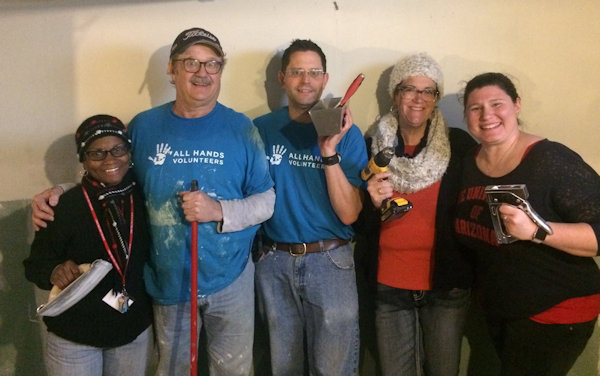A young adult missionary offers hope and finds purpose through the NW Detroit Flood Recovery Project.
PAUL REISSMANN
Michigan Area Communications
The Northwest Flood Recovery Project has changed many lives including Kayla Flannery’s. Kayla says she has become more outwardly focused after 15 months on the job in Detroit.
Flannery, 24, grew up in Arizona. She attended St. Mark’s United Methodist Church in Tucson. In 2014 she graduated from the University of Tucson with a degree in psychology and a minor in religious studies. Through her Wesley Foundation, Flannery went on a mission trip to Tuscaloosa, Alabama in May 2013, where she and other students were involved in tornado relief through AmeriCorps. This mission experience helped Flannery to realize her call to ministry through relief missions.

As one of four workers in the Northwest Detroit Flood Recovery Project, Flannery works as the Volunteer Coordinator and Office Manager. She organizes United Methodist groups, as well as those from other denominations and interfaith agencies. She manages the logistics of their work. Flannery has worked with Emergency Response Teams from as far away as Boston, MA.
Inspired by her work with AmeriCorps, Flannery has continued exploring her call through the US-2 missionary program. Flannery heard about the mission program through a friend who had become a missionary for hurricane Sandy relief. She began her work as a US-2 in August of 2015. Initially, she entered into her work as a US-2 to gain life experience, but now Flannery is considering the missionary lifestyle for the long-term. Flannery is currently exploring seminary options to continue in her ministry journey.
“Being able to see homeowners and survivors restored to wholeness is fulfilling,” Flannery said. “People often feel like they are forgotten. Helping them to see their value and self-worth restored after the flood helps them to recover themselves and their positions in life.”

The Detroit Floods were the largest FEMA-related disaster of 2014, prompting over 130,000 – 140,000 applications to the Federal relief agency. Established after the floods in August 2014 and funded through UMCOR, Northwest Detroit Recovery Project continues to offer relief to people through repairing homes damaged by the flood waters.
They do this in three primary ways. “Muck out,” aims to remedy cases of mold in a home’s drywall and carpet. The second process is repairing, repainting and/or retiling basements to pre-flood conditions. Lastly, Northwest helps to improve living conditions by replacing lost furnaces, hot water heaters or boilers. As of today, the recovery project has replaced over 50 heating units in water-damaged homes.
“UMCOR teaches that survivors are not just survivors,” Flannery explains, “but people who have needs beyond the disaster.” The recovery project also attempts to help people with food, clothing, furniture needs—whatever is necessary to restore life to conditions before the flood or even improve the life conditions of families helped.
Overall, offering relief to suffering people has had a deep impact on Flannery. “The experiences have helped me see the good in the United Methodist Church and in people,” Flannery said. “People ask, ‘why is someone giving up a week of vacation to help me?’ This has enabled me to see that people are genuinely good and not doing these things for praise.”
You can help. Contact the Northwest Detroit Flood Recovery Project by calling 313-646-4052 or email [email protected].
Last Updated on October 18, 2016

